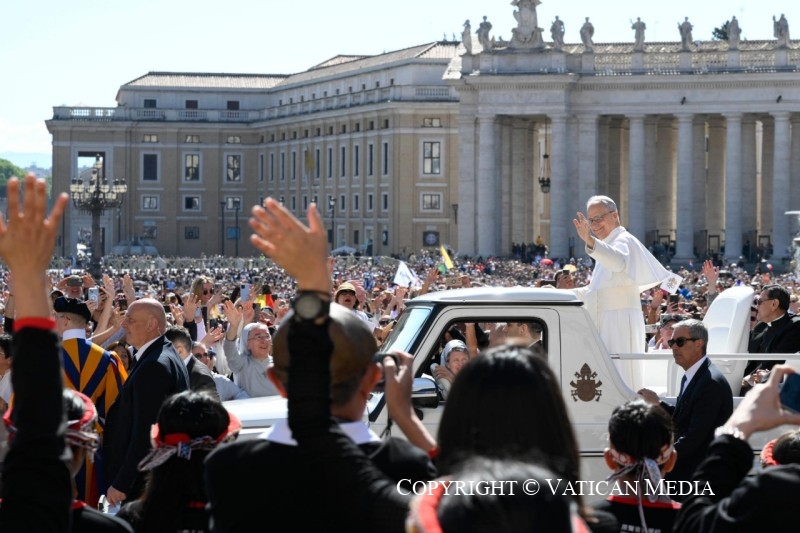Leo XIV at the audience: ‘without forgiveness there will never be peace’
This morning, the pontiff asked for prayers at the Paul VI Hall for a "disarmed and disarming" peace in “Ukraine and the Middle East.” For 22 August, the Feast of the Queenship of the Blessed Virgin Mary, he called for a day of "fasting and prayer" for the Earth "wounded by war”. In the catechesis dedicated to forgiveness, Leo explained that “betrayal can become an opportunity for salvation”.
Vatican City (AsiaNews) – Pope Leo XIV issued a call to pray this morning before thousands of faithful gathered in the Paul VI Hall for the Wednesday general audience, once again for the gift of “peace that is disarmed and disarming – for the whole world, especially for Ukraine and the Middle East.”
The pontiff asked Polish pilgrims making their pilgrimage from the Shrine of Our Lady of Jasna Góra, where the venerated icon of Our Lady of Częstochowa is preserved, to include the "plea" for peace in their prayer intentions.
Addressing Arabic-speaking pilgrims, he added: “Christians are called to love and forgive, following the example of Christ, so that their hearts may be freed from all resentment and hatred, becoming messengers of peace in the world.”
Speaking to the Portuguese group, he emphasised that “without forgiveness there will never be peace,” urging Lusophone faithful to ask for the intercession of “Mary, Queen of Peace,” “so that people may find the path to peace.”
For this Friday, 22 August, liturgical memorial of the Blessed Virgin Mary Queen, the pontiff invited "all the faithful" to fast and pray, “imploring the Lord to grant us peace and justice, and to dry the tears of those who suffer as a result of the ongoing armed conflicts. Mary, Queen of Peace, intercede so that peoples may find the path to peace.”
Mary, the pope noted, “is the Mother of believers here on Earth”.
The plea for peace is that more necessary, as “our Earth continues to be wounded by wars in the Holy Land, in Ukraine, and in many other regions of the world.”
Before the greetings, Pope Leo XIV read the catechesis, which is part of the Jubilee cycle “Jesus Christ our Hope”, dedicated to the theme of forgiveness.
“He loved them to the end” (Jn 13:2). The Gospel read at the beginning presents the passage from the Evangelist John of “the moment when Jesus, during the last supper, offers a morsel to the one who is about to betray him.”
What Jesus did “is not only a gesture of sharing: it is much more; it is love’s last attempt not to give up.”
In that tragic moment before his betrayal and death, Jesus “loved them to the end” (Jn 13:1-2). And “To love until the end: here is the key to understanding Christ’s heart,” he added.
“Jesus knows the time, but he does not submit to it”; [. . .] instead of withdrawing, accusing, defending himself… he continues to love: he washes the feet, dips the bread and offers it.”
Giving a morsel is a “simple and humble gesture,” the pope stressed. “He has understood that the freedom of the other, even when it is lost in evil, can still be reached by the light of a meek gesture”. This is at the same time an act of forgiveness.
Jesus knows that “that true forgiveness does not await repentance, but offers itself first, as a free gift, even before it is accepted.”
Despite the simplicity and gentleness of this action, Judas, the betrayer, “does not understand.” As the Gospel says: “Satan entered him” (v. 27). “This passage strikes us: as if evil, hidden until then, manifested itself after love showed its most defenceless face,” Leo said.
The morsel Jesus offers is “our salvation”. And “God does everything – absolutely everything – to reach us, even in the hour when we reject him.”
In this episode, forgiveness reveals all its “power and manifests the true face of hope.” Above all, “It is not forgetfulness; it is not weakness. It is the ability to set the other free, while loving him to the end. Jesus’ love does not deny the truth of pain, but it does not allow evil to have the last word.”
Even though relations break and unspoken words “remain suspended [. . .], the Gospel shows us that there is always a way to continue to love, even when everything seems irredeemably compromised.”
“To forgive does not mean to deny evil, but to prevent it from generating further evil. It is not to say that nothing has happened, but to do everything possible to ensure that resentment does not determine the future,” said Pope Leo XIV.
When Judah leaves the house, it is night. And “we too experience painful and difficult nights.” Yet, “the Lord shows us the hope that another way exists, always exists. He teaches us that one can offer a morsel even to someone who turns their back on us.”
A light breaks through the darkness of the night. “When the light of forgiveness succeeds in filtering through the deepest crevices of the heart, we understand that it is never futile.” Thus, “betrayal can become an opportunity for salvation”.







.png)










